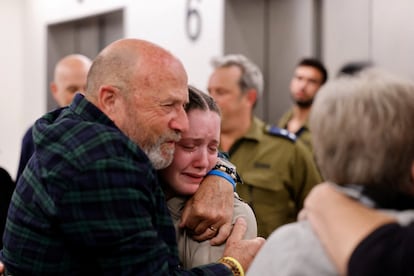Women, children and foreign nationals: The hostages released by Hamas during the ceasefire
In the first four days of the truce with Israel, the Islamist militia has freed 69 people, including 51 Israelis, 17 Thais and a Filipino citizen

Eight-year-old Ela and her sister Dafna, 15, were abducted by Hamas on October 7 after witnessing the death of their father, his partner, and her son in the Israeli kibbutz of Nahal Oz. The attack in Israel resulted in the deaths of 1,200 people and the kidnapping of at least 240 others — including Ela and Dafna — who were forcibly taken to the Gaza Strip. The two returned home on Sunday and are among the 69 hostages who have been released in the first four days of the truce between the Israeli government and Hamas. Of this group, 51 are Israelis, in addition to 17 Thais and one Filipino. Except for one man who holds dual Israeli and Russian citizenship, the other Israelis released are women (22) and children (28).
“A moment forever etched in my memory,” wrote Maayan Zin, the mother of both girls, in a post on social media accompanied by a video of the reunion with her daughters. Their embrace is one of the images that sums up the relief of dozens of Israeli families who have seen their relatives returned after weeks of pressure, both local and international, on Israeli Prime Minister Benjamin Netanyahu to forge a pact with Hamas agreeing to the release of hostages. The ceasefire was extended Monday for two more days in a new deal brokered by Qatar that will allow the return of 20 more hostages in exchange for the release of 60 Palestinian prisoners held in Israel.
On Monday, the last day of the initially agreed truce, 11 Israeli hostages were released — nine minors and two women — all with dual nationality: three with French citizenship, two with German and six with Argentine. All were kidnapped in the kibbutz of Nir Oz. French President Emmanuel Macron celebrated the release of his compatriots: “Extremely happy with this announcement,” he said. The Argentine Foreign Ministry thanked Qatar for its “collaboration” in the mediation efforts.
A fragile truce
The truce began Friday at 7 a.m. local time, with a ceasefire in Gaza and the entry of humanitarian aid throughout the Strip, one of the conditions demanded by Hamas. In the afternoon, Egypt suddenly announced the release of a group of Thai nationals — nine men and a woman — and a Filipino citizen, who were working in the agricultural sector near the enclave, as the result of a parallel negotiation between Thailand and Hamas.
Hours later, the Red Cross confirmed the release of 13 other Israeli nationals, including six women aged over 70, three adult women, two girls and a boy. The latter, Ohad Munder, turned nine while being held hostage in Gaza. The emotional encounter in which he ran into his father’s arms at the Schneider Medical Center, located on the outskirts of Tel Aviv, went viral on social media.
That same night five elderly women were also released. Margalit Mozes, 77, is a cancer survivor and suffers from diabetes, as does Chana Peri, 79, the only one of this first group who did not come from Kibbutz Nir Oz.
Delays and uncertainty marked the exchange of Israeli hostages for Palestinian prisoners on Saturday — the second day of the truce and the 50th day of the ongoing conflict — after the armed wing of Hamas claimed that Israel was not complying with the agreement regarding the entry of humanitarian aid trucks into Gaza. The United Nations later confirmed that 137 trucks from its proxy were unloaded in the enclave, the largest aid convoy delivered since October 7.
The standoff was not resolved, through the mediation of Qatar and Egypt, until late in the evening. The Israeli military announced late Saturday that a group of 13 Israeli women — seven minors and six adults — and four Thais had been transferred to Egypt by Red Cross representatives to be taken to Israel.
Except for 21-year-old Maya Regev, who was abducted with her brother from the Nova music festival, all the released Israelis were living in Kibbutz Beeri, one of the bloodiest scenes of the Hamas massacre. Among them was Adina Shoham, 38, who was kidnapped along with her children Yahel, 3, and Navel, 8, and her mother, 67. The children had dual German nationality through their grandfather, who was killed during the October 7 attacks.
The fragility of the truce was also highlighted on Sunday, when in the morning the Red Crescent reported the death of a Palestinian farmer at the hands of the Israeli army in central Gaza. However, the release of hostages continued without major complications. Hamas claimed in mid-afternoon to have released a Russian national “in appreciation of [Russia’s] position in support of the Palestinian cause.” The hostage was identified as Ron Kivoy, 25, a Russian-Israeli citizen who was working as a technician at the music festival.
Within minutes, Israel reported that the Palestinian militia had handed over 17 hostages — 14 Israelis and three Thais — to the Red Cross. The first U.S. citizen, Avigail Idan, who turned four last Friday, was also released Sunday. On Monday, the White House said it believes that eight or nine U.S. hostages were still being held by Hamas.
The case of Alma Avraham, the oldest Hamas hostage at 84, who had to be evacuated by helicopter to a hospital because she was in serious condition according to Israeli public television, also came to light that day. Her family complained to the local press that she had not received vital medication while in captivity.
Sign up for our weekly newsletter to get more English-language news coverage from EL PAÍS USA Edition
Tu suscripción se está usando en otro dispositivo
¿Quieres añadir otro usuario a tu suscripción?
Si continúas leyendo en este dispositivo, no se podrá leer en el otro.
FlechaTu suscripción se está usando en otro dispositivo y solo puedes acceder a EL PAÍS desde un dispositivo a la vez.
Si quieres compartir tu cuenta, cambia tu suscripción a la modalidad Premium, así podrás añadir otro usuario. Cada uno accederá con su propia cuenta de email, lo que os permitirá personalizar vuestra experiencia en EL PAÍS.
¿Tienes una suscripción de empresa? Accede aquí para contratar más cuentas.
En el caso de no saber quién está usando tu cuenta, te recomendamos cambiar tu contraseña aquí.
Si decides continuar compartiendo tu cuenta, este mensaje se mostrará en tu dispositivo y en el de la otra persona que está usando tu cuenta de forma indefinida, afectando a tu experiencia de lectura. Puedes consultar aquí los términos y condiciones de la suscripción digital.









































